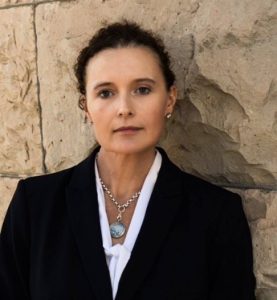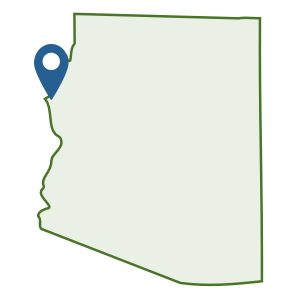
By Elliott Bochstein, RCAC Staff Writer
In Arizona, two-thirds of counties have fewer than one lawyer per 1,000 residents. Despite this imbalance, traditional banks and lenders were a no-show when COVID-19 threatened to shut down a woman-owned law firm in rural Mohave County. RCAC’s timely Paycheck Protection Program (PPP) loan enabled Attorney D’Arcy Downs-Vollbracht to continue providing low-cost and free legal assistance to her community.
As a small business owner and experienced attorney of nearly 20 years, D’Arcy Downs-Vollbracht had developed the reputation as a diligent problem solver in her rural Mohave County, Arizona community. However, COVID-19’s devastating financial impact blindsided the lawyer.
General counsel D’Arcy owns Concierge Legal Consulting Group, PLLC. Most of her clients are healthcare providers and physicians in medically underserved communities. As the pandemic sent shockwaves through U.S. healthcare systems, Concierge’s revenue stream fell into a tailspin.
“The laws were changing daily, and I was working around the clock to keep healthcare organizations in compliance with the latest state and federal recommendations,” D’Arcy said. “My physician clients were awaiting government relief funds at that point, and my income just stopped.”
There’s precious little room for cutting costs in asset-light businesses like small law firms; D’Arcy relied on contract staff and an office-sharing arrangement to keep expenses in check. She set aside a nominal salary for herself. Her husband, a county employee, also helped support the business. D’Arcy’s first $9,000 federal PPP loan covered pandemic-related expenses for eight weeks, but the loan was no more than a band-aid on a much deeper wound. In any case, she needed whatever help she could get and was grateful for the forgivable U.S. Small Business Administration (SBA) loan.
“As a solo business owner, just getting that first PPP loan was a very difficult process. I nearly gave up,” D’Arcy admitted.
One of her top concerns was whether it was still feasible to provide discounted and free legal services to low-income clients — a labor of love that allowed her to create just outcomes for poor and marginalized community members.
“I’ve devoted 25 percent of my practice’s time to low-cost and pro bono assistance for the community in Mohave County,” she said. “The healthcare part of my practice helps me keep up that work.”
One of these clients was a small but capable nonprofit organization struggling to open a substance abuse treatment center for women. Another client wanted to start a dog grooming business, but she needed help obtaining a license, setting up an LLC and filing paperwork. A third client, a single father of three, was at risk of losing custody of his kids after a bad traffic accident threatened to snowball into a major lawsuit. The fact that this young man owned his old beater car and he hovered just above the poverty line prevented him from gaining access to community legal aid.
“I know the community very well and they’re good people, but the issue is resources,” she explained, describing a local economy dominated by ranching, casinos and a sparsely developed service sector. “We have very few lawyers in the area.”
A vast “legal desert” stretches across the rural West, where qualified attorneys are expensive and hard to find. At the same time, the demand for legal services remains as high as ever. This systematic imbalance means that many rural community members can’t access the protection of the law, or justice itself, which has grave consequences for their social and economic development. The American Journal of Public Health published a recent study that found the shortage of lawyers to be a critical health determinant in rural areas — particularly during crises like the COVID-19 pandemic, which exacerbated inequalities and saw a harrowing rise in unemployment, evictions, exposure to racial discrimination, domestic violence, benefit instability and general social need.

Arizona ranks near the bottom of the nation in per capita lawyers. A 2020 American Bar Association survey found that 10 of the state’s 15 counties had fewer than one lawyer for every 1,000 citizens. Meanwhile, Arizona Daily Star reports that the average lawyer’s hourly rate in the state is $260. Under such circumstances, it’s unsurprising that 75 percent of in-state cases involve a party who chooses to forgo an attorney and represent themselves.
D’Arcy views such conditions as morally and socially unconscionable, so she works with pro bono and sliding-scale clients through the Modest Means Project. The initiative is a joint Arizona Bar Foundation and State Bar of Arizona effort to establish low-cost legal assistance “oases” for residents who can’t afford it or don’t meet other programs’ criteria.
“I think I’m the only one in the county who does it, to be honest,” D’Arcy said. She was heartbroken to think that she might have to cut off the most rewarding aspect of her work for the sake of business survival.
“For several months, I stopped taking in pro bono cases, and I was afraid I would have to terminate my existing clients and shut down this vibrant way of helping my community,” D’Arcy said. “I couldn’t do my best work for them; I didn’t have the time or resources, and I was getting burned out from overwork.”
When the SBA announced Second Draw loans for PPP-eligible lenders in January 2021, D’Arcy had just informed her office landlord that she needed to terminate the lease; nothing else was left to cut. Despite her stable financial history, she found that banks and lenders were hardly enthusiastic about helping her apply for the second PPP. Her bank of 30 years, where she kept her personal and business accounts, wouldn’t even return her phone calls. Many banks were still unclear about the hastily developed SBA program’s guidelines and procedures, but D’Arcy and her clients didn’t have a moment to spare as the May 31, 2021, application deadline bore down on them.
“I’ve always been responsible, even if I’m not rich. It was so scary, it was really up to the deadline,” D’Arcy said. “I was up all night in tears.”
Although financially and mentally strained, D’Arcy continued to help those less fortunate than herself. As she searched online for housing resources for a migrant family, she came across Rural Community Assistance Corporation (RCAC), whose Loan Fund announced that it was accepting and processing PPP loan applications.
“I remember this so well: I had just told my client that I was winding down my practice and probably wouldn’t be able to continue doing pro bono or Modest Means,” she said. “And then I found RCAC.”
D’Arcy was unaware that at the time, RCAC’s Loan Fund was infusing record-breaking amounts of capital into hard-strapped communities through PPP loans, deferred loan payments and open access to affordable credit lines. In 2021 alone, RCAC closed 209 PPP loans for small businesses and nonprofits across the rural West. RCAC is a federally certified Community Development Financial Institution (CDFI), SBA 7a Community Advantage Lender and, most importantly, a nonprofit firmly dedicated to its mission: to provide financial support to rural and Indigenous economies and persistent poverty areas, especially in times of crisis.
D’Arcy called RCAC and was thrilled to reach an actual Loan Officer on the other line – no small feat in a world of dead-end voicemail boxes and automated phone system loops. The loan officer expedited D’Arcy’s application with only a week to spare before the deadline.
The application was swiftly approved, and her second-round $20,833 PPP loan originated on May 27, 2021. As a result, D’Arcy could maintain her lease and refocus on pro bono and sliding-scale fee work; she successfully resolved each of her three clients’ cases.
“I have so many clients and so much responsibility, but as a woman and small business owner, I’m constantly being underestimated,” D’Arcy said.
“RCAC treated me with respect like my business mattered. They understood what I was doing in my community – understood, which is key,” she emphasized. “RCAC understood the urgency, took a chance and helped me when I needed it most. What more could you ask for?”
